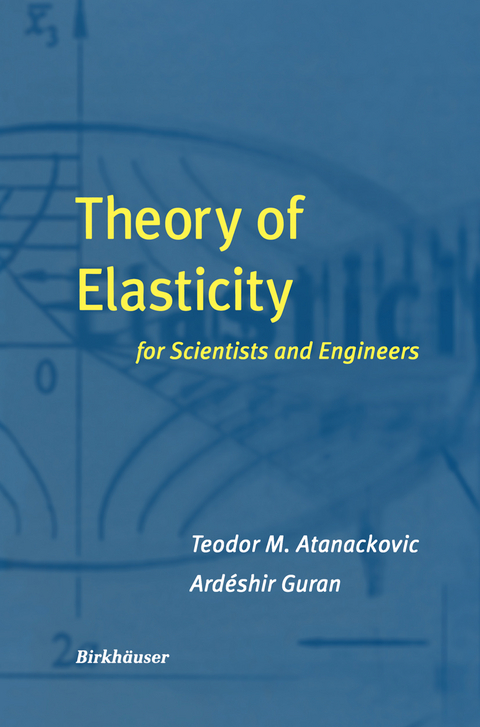
Theory of Elasticity for Scientists and Engineers
Springer-Verlag New York Inc.
978-1-4612-7097-3 (ISBN)
This book is intended to be an introduction to elasticity theory. It is as sumed that the student, before reading this book, has had courses in me chanics (statics, dynamics) and strength of materials (mechanics of mate rials). It is written at a level for undergraduate and beginning graduate engineering students in mechanical, civil, or aerospace engineering. As a background in mathematics, readers are expected to have had courses in ad vanced calculus, linear algebra, and differential equations. Our experience in teaching elasticity theory to engineering students leads us to believe that the course must be problem-solving oriented. We believe that formulation and solution of the problems is at the heart of elasticity theory. 1 Of course orientation to problem-solving philosophy does not exclude the need to study fundamentals. By fundamentals we mean both mechanical concepts such as stress, deformation and strain, compatibility conditions, constitu tive relations, energy of deformation, and mathematical methods, such as partial differential equations, complex variable and variational methods, and numerical techniques. We are aware of many excellent books on elasticity, some of which are listed in the References. If we are to state what differentiates our book from other similar texts we could, besides the already stated problem-solving ori entation, list the following: study of deformations that are not necessarily small, selection of problems that we treat, and the use of Cartesian tensors only.
1 Analysis of Stress.- 1.1 Introduction.- 1.2 Stress vector. Cauchy’s theorem.- 1.3 Equilibrium equations in terms of stress components.- 1.4 The basic lemma of stress analysis.- 1.5 Equilibrium equations in coordinate systems.- 1.6 Transformation of stress matrix. Stress tensor.- 1.7 Extreme properties of principal stresses.- 1.8 Invariants of the stress tensor.- 1.9 Extreme values of shear stresses.- 1.10 Spherical and deviatoric part of stress tensor.- 1.11 Mohr’s stress circles.- 1.12 Plane state of stress.- 1.13 Normal and tangential stresses in the plane state of stress.- 1.14 Mohr’s circle for plane state of stress.- 1.15 Stresses at the outer surfaces of a body.- 1.16 Linear state of stress.- Problems.- 2 Analysis of Strain.- 2.1 Introduction.- 2.2 Measures of deformations. Strain tensor.- 2.3 Extension and shear angle for arbitrary directions.- 2.4 Infinitesimal rotation.- 2.5 Principal directions of strain tensor.- 2.6 Strain tensor in coordinate systems.- 2.7 Compatibility conditions for linear and nonlinear strain tensor.- 2.8 Plane state of strain.- 2.9 Linear strain tensor. Cubical dilatation.- 2.10 Measurement of strain. Strain gauges.- Problems.- 3 Hooke’s Law.- 3.1 Introduction.- 3.2 Transformation of the elasticity tensor by rotation of coordinate system.- 3.3 Anisotropic, orthotropic, and isotropic elastic body.- 3.4 Lamé constants. Modulus of elasticity. Poisson ratio.- 3.5 Influence of temperature on the stress-strain relation.- 3.6 Hooke’s law in cylindrical and spherical coordinate systems.- 3.7 Beltrami-Michell compatibility conditions.- 3.8 Finite deformations in linear state of stress.- Problems.- 4 Boundary Value Problems of Elasticity Theory.- 4.1 Introduction.- 4.2 Classification of problems.- 4.3 Lamé equations coordinatesystems.- 4.4 Uniqueness of solution.- 4.5 Assumptions about solution of equilibrium equations.- 4.6 Methods of solution.- 4.7 Saint-Venant principle.- Problems.- 5 Solutions for Some Problems of Elasticity Theory.- 5.1 Introduction.- 5.2 Heavy rod.- 5.3 Rotating rod.- 5.4 Spherical shell under inner and outer pressure.- 5.5 Torsion of a prismatic rod with an arbitrary cross-section.- 5.6 Torsion of a rod with variable circular cross-section.- 5.7 Bending by couples (pure bending).- 5.8 Bending of a rod by a terminal load.- 5.9 Elementary singular solutions.- 5.10 The Boussinesq problem.- 5.11 Tangential force on the elastic half space.- 5.12 Equilibrium of a circular cone.- 5.13 Thermal stresses in a sphere and in a cylinder.- 5.14 Plane harmonic waves in an elastic and thermoelastic body.- Problems.- 6 Plane State of Strain and Plane State of Stress.- 6.1 Introduction.- 6.2 Stress function method for the solution of plane problems.- 6.3 Some solutions of the plane problems.- 6.4 Complex variable method for plane problems.- Problems.- 7 Energy Method in Elasticity Theory.- 7.1 Introduction.- 7.2 Work and inner energy.- 7.3 Betti’s theorem.- 7.4 Maxwell’s theorem.- 7.5 Principle of virtual work.- 7.6 Principle of virtual displacements.- 7.7 Principle of virtual forces.- 7.8 Minimum of potential and complementary energy theorems.- 7.9 Castigliano’s theorems.- 7.10 Hu-Washizy and Reissner variational principles.- Problems.- 8 Elementary Theory of Plates.- 8.1 Introduction.- 8.2 Basic equations of von Kármán’s theory of plates.- 8.3 Boundary conditions.- 8.4 Small deformations: An example.- 8.5 The influence of shear stresses: Reisner-Mindlin theory.- Problems.- 9 Pressure Between Two Bodies in Contact.- 9.1 Introduction.- 9.2 Hertz’s Problem and ItsSolution.- 9.3 Examples of Contact Stresses.- 9.4 Theory of Elastic Impact.- Problems.- 10 Elastic Stability.- 10.1 Introduction.- 10.2 Definitions of stability.- 10.3 Basic theorems of the dynamic method.- 10.4 Examples.- Problems.- References.
| Zusatzinfo | XII, 374 p. |
|---|---|
| Verlagsort | New York |
| Sprache | englisch |
| Maße | 155 x 235 mm |
| Themenwelt | Naturwissenschaften ► Chemie ► Analytische Chemie |
| Naturwissenschaften ► Physik / Astronomie ► Festkörperphysik | |
| Naturwissenschaften ► Physik / Astronomie ► Mechanik | |
| Technik | |
| ISBN-10 | 1-4612-7097-9 / 1461270979 |
| ISBN-13 | 978-1-4612-7097-3 / 9781461270973 |
| Zustand | Neuware |
| Haben Sie eine Frage zum Produkt? |
aus dem Bereich


